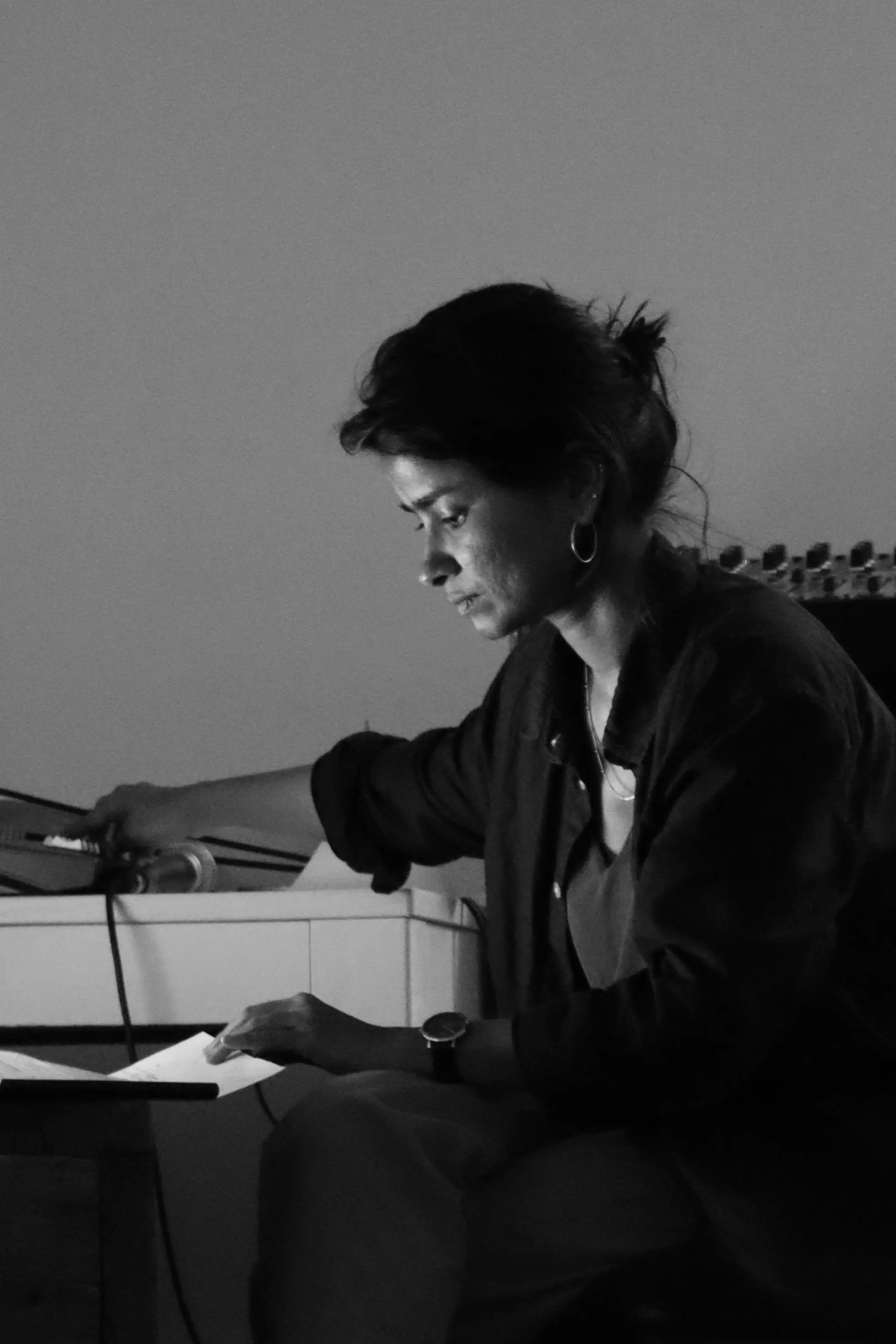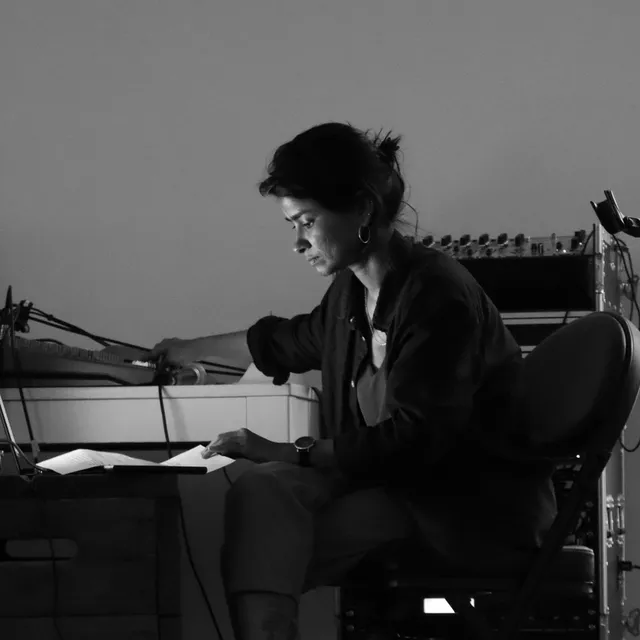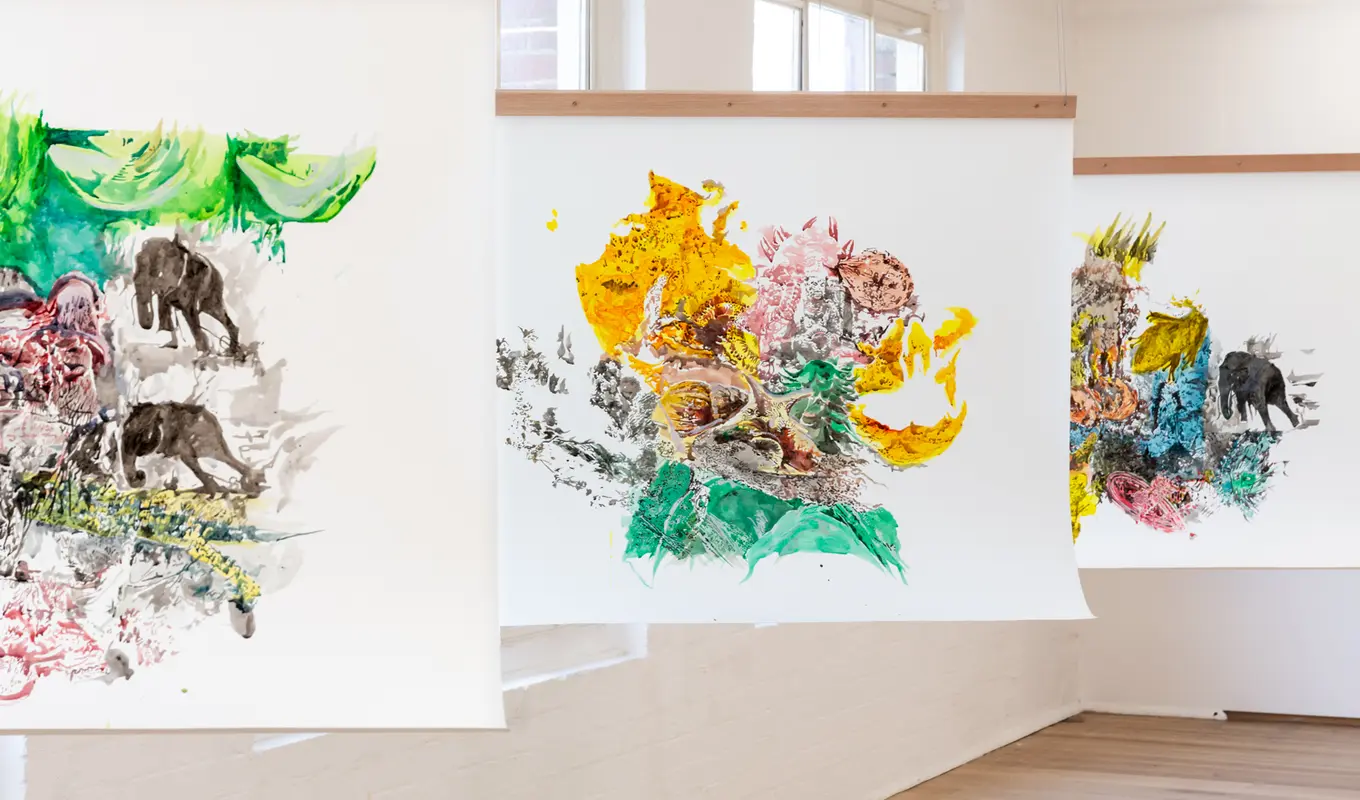“Recompositions”
Vaibhav Abnave, Priyanka Chhabra, Merve Ertufan & Mochu, Merv Espina, Kathryn Gledhill-Tucker, Shareeka Helaluddin, Alana Hunt, Aarti Jadu & Claire de Carteret, Ronen Jafari, Machine Listening, Laura McLean, Rahee Punyashloka, Raqs Media Collective, Hayden Ryan, Joel Sherwood Spring, Aarti Sunder, Suvani Suri, Thomas Smith, Aasma Tulika and Book Show-I
13 Feb → 23 Feb 2025
Public Program

Recompositions convenes discursive and performative events accompanying the exhibition The place we do not know is the place we are looking for.
Amplifying the mode of the gathering, this program assembles and attends to resonant practices that are inventing languages to hold ineffable dreams, desires, stories, and encounters, unfixed from the discretisation of time, bodies, and sensing.
Curated by Laura McLean and Suvani Suri, discussions, screenings, performances, workshops and food unfolded across Naarm/Melbourne in February 2025.
Thursday 13 February @ George Paton Gallery
6 → 8pm: Vaibhav Abnave, I am only Making a Report, 2023
On 6 July 2019, Zameer Kamble, Santosh Makude and Soumyabrata Choudhury performed Franz Kafka's Ein Bericht für eine Akademie in German, Marathi and English at a performance studio in Pune. Two days earlier, in the same studio, Soumyabrata Choudhury delivered a lecture titled Certain Propositions on the possible (non)relation between Theatre and Philosophy.
This film is a report of these two evenings, the rehearsal sessions leading up to the performances and actors watching the preview of the film.
Tuesday 18 February @ West Space
11 → 1pm: score for a subtle body: Workshop by Shareeka Helaluddin
In a world that atomises, stifles and denies us magic, this workshop seeks to find pockets of solace and possibility through voice, movement, meditation and experimentation. Shareeka shares stories and methodologies of prioritising feeling, finding collective resonances and seeking play amid chaos.
2.30 → 4pm: A Field (of) Recording: Discussion with Hayden Ryan, Aarti Jadu & Claire de Carteret
The artists discuss their work and approaches to field recordings in relation to land, Country, memory, and materiality.
6.30 → 8.30pm: Priyanka Chhabra, Iqraar-naama (The Agreement), and Raqs Media Collective, The bicyclist who fell into a time cone: Screenings followed by a conversation with Priyanka Chhabra
"These film works are underscored by a curatorial interest in the attempts to stage and read specific historical disjunctures, in forms that often cascade between documentary sources, archival fictions and speculative détournements.
By bringing them together, we imagine the works conversing with each other, carrying both a lightness of approach and intensity of thought contending with the ideas in the exhibition." — Laura McLean & Suvani Suri
Wednesday 19 February @ MUMA
11am → 2pm: Machine Listening Workshop
Ego4D is a massive-scale egocentric video dataset and benchmark suite released by Facebook AI in 2021 to advance the automation of ‘egocentric perception’. This is the ‘first person’ perspective of virtual reality, robotics, smart glasses, and the Metaverse. Like all perspectives, it has to be constructed. So, Ego4D comprises 3,025 hours of daily-life activity video captured by 855 ‘unique camera wearers’ from 9 countries, and all painstakingly annotated by low-paid ‘narrators’ for machinic analysis.
Presented in collaboration with Monash University Museum of Art (MUMA) as part of the exhibition Image Economies, participants examine Ego4D through clips, excerpts from the paper announcing it, and experiment with annotating “egocentric” videos.
Thursday 20 February @ West Space
11 → 1pm: Rock Paper Scissors: Readings by Priyanka Chhabra
Collective reading of Priyanka Chhabra's book Rock Paper Scissors, bringing together a plurality of languages and voices in an attempt to make sense of the messiness of history, lines, dates and documents. With readings in English, Punjabi and Hindi, this session follows into thinking about forms through which the voices in the book can be read and heard, in participatory and performative ways.
Friday 21 February @ CY Space, Collingwood Yards
11 → 1pm: Readings: Suvani Suri & Laura McLean and artists
3 → 4pm: Alana Hunt, Surveilling a Crime Scene: Screening
Surveilling a Crime Scene examines the materialisation of non-Indigenous life on Miriwoong Country—through the town of Kununurra and its surrounds, in the remote north-west of Australia. The film aligns and overlays what may otherwise seem like discontinuous domains—a dam, tourism, a historical monument, agriculture, a police station, cigarette burns, bureaucratic forms—to produce a silhouette of tools, techniques, and procedures of power and oppression.
5 → 6pm: HOLECODED: Lecture-performance by Joel Sherwood Spring
Joel Sherwood Spring takes us through his recent explorations in constructing a game that plays itself. Extending from his recent HOLECODED, the session will explore subjective states made by and through digging and extraction. Looking at an experience of the plot holes that extractive practices produce, both the tunnel and tunneler are brought forth in this journey.
6 → 7pm: For every name a forest: Discussion with Merv Espina & Kulagu Tu Buvongan
How can political and social justice art give concrete contributions to the causes and communities they address? What do projects like these actually mean to a community under threat of death? What are the lessons and failures of such projects, and what measures can be done to address them?
Saturday 22 February @ CY Space, Collingwood Yards
11am → 1pm: Aarti Sunder & Rahee Punyashloka
The artists present on their works, responding to the material of memory and memorialisation while working through the modes of writing, fictioning and listening.
2 → 3pm: The place we do not know is the place we are looking for exhibition walk-through with Suvani Suri & Laura McLean and artists
3.30 → 4.30pm: Pathos: Notes on a system: Lecture-performance by Thomas Smith
Thomas Smith explores a series of questions related to his work Pathos: The transience of things, including: Is technocracy an ideology, a philosophy, a religion, a pipe dream or a pyramid scheme? What might a soft dictatorship of data and rationality feel like? Will technocratic management be forever frustrated by the social?
5 → 6:30pm: Ion Drift: Postscripts on the move: Lecture-performance by Merve Ertufan & Mochu
Looking at geography as philosophical terrain, set largely around the Aegean region in Türkiye and parts of Greece. The work takes off from notes about the historical origins of philosophical thought in Ancient Ionia and how it was tied to notions of political freedom and equality. Generally, philosophy is assumed to be an abstract, contemplative activity. However, the systems of thought developed in Ionia reveal how freedom of movement and the emergence of the individual are both tied to the recognition of immanent physical laws, as opposed to speculative, transcendental ideas.
7 → 8pm: Bootleg Tongue mixtape: Performance by Aasma Tulika
Re-composing musical traditions to bypass rubrics of classicisation. It draws upon histories of speech and rhythms that address communication systems, and excesses of social hierarchies. It is a call and response to the ways in which binaries appear and circulate in the attention economy.
Sunday 23 February @ KINGS
12 → 6pm: Cookout Scenes with I'm all out of spoons: Ronen Jafari & Juliette Berkeley and super dumpling potluck: Merv Espina
This closing event includes performances by Aasma Tulika, Reibang Chakma, Shareeka Helaluddin, Thomas Smith, Suvani Suri and friends.
Recompositions is supported by the Centre for Australia-India Relations Maitri Cultural Partnerships Program.
Vaibhav Abnave is an independent researcher and filmmaker. Through his films, he explores the intersection of theatre and cinema, documentary and fiction. His films Blur, 2008, and Monologue, 2013, have been shown at various international film festivals. Presently, he is Associate Professor (Film Direction) at the Film and Television Institute of India, Pune.
Priyanka Chhabra lives and works out of Delhi, India, as an artist, film director and editor exploring notions of home, memory, landscape and relationships of people to places. She articulates her practice as an archaeology of silences, digging at sites characterised by trauma; physical and emotional. Since 2017 her work has focussed on reconciling memories and experiences of the Partition of Punjab (1947) through a trilogy of works - Rock Paper Scissors (2024), Iqraar-naama (The Agreement, 2022) and Pichla Varka (The Previous Page, 2019).
Merve Ertufan makes installations, videos, sound-arrangements, texts and objects. Her practice engages with what might be called the microphysics of the mind, observing inconsistencies, gaps and dead-ends in language and habit. Speech, written text and gestural detours of the body frequently combine to form game-like relationships, with compulsive paradoxes, stories, questions and riddles informing their play.
Based between Delhi and Berlin, Mochu works with video and text, arranged as installations, lectures and publications. Technoscientific fictions and subcultural formations feature prominently in his practice, often modulated with anxiety, futurity and weird selfhoods. Hosting cameos from art history, media theory and philosophy, recent projects have explored the nostalgic remains of cyberpunk, civilizational battles on the internet, corporate encounters with deep time, and other psychonautic drifts across landscape, madness and states of intoxication.
Merv Espina is an artist and curator in Las Piñas, Metro Manila. His artistic practice involves sound, exploring it as both space, form and material. He is a member of the Academy of the Arts of the World.
Kathryn Gledhill-Tucker is a Nyungar technologist, writer, and digital rights activist living on Whadjuk Noongar boodjar. Their work explores custodial approaches to data management, interrogating systems of surveillance, and using creative technology to explore coding as a liberatory practice.
Shareeka Helaluddin is an experimental artist, radio broadcaster, DJ and community facilitator interested in the sonic, written word and collective organising. Creating under the pseudonym akka, she fuses voice memos, found-sounds, echoic compositions, and influences of her mixed-multifaith lineage in the pursuit of divinity and connection.
Alana Hunt makes art and writes, finding ways for this material to move affectively through the public sphere and the social space between people. She has worked with journalists, filmmakers, human rights defenders and lawyers on award-winning bodies of work that unfold over many years, with gradual yet accumulating resonance in the places they take root, and beyond. Alana’s work is driven by lived experiences and honed through a forensic approach to research. It is shaped by relationships and often materialises through video, printed matter, photography, publishing, public events and illicit interventions.
From a background of group devotional singing and folk tradition, Aarti Jadu seeks to integrate participatory work into contemporary composition and interactive works of art. Claire de Carteret is a ceramicist exploring clay chemistry, technologies, and resonating sculptural form. They share an interest in how listening rather than hearing, cultivates intimacy, subjective interpretation and reflection.
Ronen Jafari is an artist with a focus on sustainability through culinary practices. He has been Administrator at West Space since early 2023, and with a background in business and finance Ronen also works across Liquid Architecture and TBC Gallery. In 2023, Ronen self-published a cookbook offering ways to integrate plant-based cooking into a busy, low-budget share house kitchen.
Machine Listening is a platform for collaborative research and artistic experimentation, focused on the political and aesthetic dimensions of the computation of sound and speech. Established in 2020 by artist-researchers Sean Dockray, James Parker, and Joel Stern, the collective works across diverse media and modes of production.
Laura McLean is a curator and researcher based in Naarm/Melbourne. As Associate Curator at Liquid Architecture and Artistic Director at Blindside, she works with experimental practices and critical ideas engaging sound, listening, and media technologies across Australia and the Asia-Pacific.
Rahee Punyashloka is an artist, writer, researcher, and experimental filmmaker based out of Bhubaneswar and New Delhi. Working across disciplines, he seeks to illuminate the vastly un/underrepresented artistic history of the anti-caste struggle and the Dalit identity through interventions around lingering absences and speculative extrapolations within the archive.
Raqs Media Collective are artists, curators, and thinkers based in Dehli, India. Founded in 1992 by Jeebesh Bagchi, Monica Narula and Shuddhabrata Sengupta, the collective’s collaborative practice meets at the crossroads of art, documentary filmmaking, new media and critical theory; operating on the cusp of theoretical explorations and metaphorical and aesthetic discourse. Raqs is a word in Persian, Arabic and Urdu used for ‘dance’, that means the state that whirling dervishes enter into when they whirl. The collective explain that Raqs could be an acronym for ‘rarely asked questions’.
Hayden Ryan is a Yuin First Nations sound scholar and spatial audio artist from the south east coast of New South Wales, currently in Naarm/Melbourne. His work centres Indigenous sonic and spatial practice, a concept that realises the inextricability of land, body sound and culture within Indigenous knowledge systems.
Joel Sherwood Spring Wiradjuri anti-disciplinary artist based in Sydney/Gadigal/Wangal lands. He works collaboratively on projects that examine ways of seeing Country through technology and desires for Indigeneity. Joel’s work confronts and channels both the desire for land and minerals at the core of our national identity and what today appear as 'progressive' identity formations. He explores the potential of Indigenous materialist readings of art and architecture towards repatriation, reparation, and return of land. He is learning how to employ art making, exhibition making, publishing, and pedagogy within what is recognised as black or Indigenous studies.
Aarti Sunder is an artist living and working in India. She works with moving image, writing, drawing and painting. Her interests lie within techno-politics, focusing on the study of infrastructure and society – from contemporary labour practices, fictional edges of protest, myth, and digital-terrestrial play to expanded platform politics.
Suvani Suri is an artist, writer and curator in New Delhi, India. Suvani works with sound, text, and intermedia assemblages that think through modes of listening and voicing. Her artistic, research, and curatorial inquiries plumb the gaps, cracks, and leaks found within the technological processes of production, mediation and perception of sound.
Thomas Smith is an Eora/Sydney based artist, musician, educator and researcher. His practice combines performance, video, electronic music, speculative fiction, websites, curatorial projects and critical writing. Thomas’ work is concerned with the social effects of computational systems, the politics of creative economies, emerging digital subjectivities and electronic music as a mode critical inquiry.
Aasma Tulika is an artist based in Delhi. Her practice engages with moments that disturb belief systems, and their intersection with technology and social relations. She works with unwritten codes, fictional events and peer networks that appear in the form of video installations, sound albums, performances and publications.
Book Show-I initiated by Priyesh Gothwal includes several artist books, sketchbooks, comics, zines, and other publications in a mobile, itinerant reading space, inviting new permutations with each encounter and evoking a keen interest in exploring the book as a form, medium and content. The books acquire their own spaces and, when placed together, create pockets that bring various narratives into that space. One of the impulses towards the show was to sustain the tactility of books, to have them as objects. Several bookstands, shelves, and platforms were built to explore these concepts. Book Show-I, Excerpts that makes its appearance on the bookshelf at West Space is a part of Book Show-I – compact and feasible enough to travel long distances while still holding the framework together.

